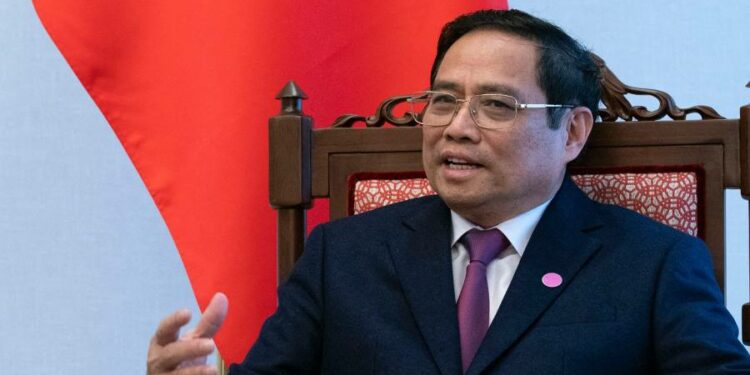In May, Vietnam’s leader held a series of meetings in California, from a tête-à-tête with Apple chief executive Tim Cook to a gift exchange at Google’s campus, to tell Silicon Valley his country was open for business. Simultaneously, at home on the other side of the Pacific, the country’s one-party government was drafting internet rules that sent jitters through the technology sector.
Vietnam’s activities on opposite sides of the ocean lay bare two competing ambitions — one to digitise the fast-growing economy of 99mn people, the other to keep the web under its thumb.
During his trip, Prime Minister Pham Minh Chinh met representatives from Facebook and Google, two foreign tech giants that profit most from the Vietnamese market but which also are lobbying against Hanoi’s internet controls. The latest battle concerns changes to Vietnam’s contentious Decree 72, which would force social media platforms to censor posts within 24 hours of receiving a demand from authorities.
“Efforts to subject those services to very harsh controls [send a] negative message,” said Vu Tu Thanh, Vietnam representative at the US-Asean Business Council, whose members include Google and Facebook parent Meta.
The companies themselves, which declined to comment, already comply with orders to block offending content, such as criticism of the government or Covid-19 misinformation. The draft decree threatens penalties if those blocks do not happen within 24 hours. It also would restrict activities on other platforms, such as video clips on TikTok and YouTube livestreams. Data storage would also be affected. Under the draft, internet platforms must keep data inside Vietnam and not transfer it across borders without approval.
Businesses say such limits contradict the south-east Asian country’s goal to develop a digital economy, precisely the goal Chinh was promoting on his coast-to-coast tour of the US.
State videos and photos released in May showed a relaxed and smiling premier — sauntering past a rainbow logo at Google, taking the stage for a speech at Intel, chatting with Cook beside lush trees at Apple.
“We want to create trust and efficiency, clear opportunities in business and not cause trouble or worry for investors,” he said on the tour, according to the government’s website. He called on the tech industry to increase investment in Vietnam, partner local companies and give workers digital training, sources in the industry and the government told Nikkei Asia.
“That’s the fundamental, contradictory” choice for Vietnam, said Huong Le Thu, principal fellow at the think-tank Perth USAsia Centre, in an interview. “Global integration, or the need to have control?”
She added: “Sooner or later, that tension will surface.”
Data restrictions would “breach” Vietnam’s obligations under the CPTPP trade deal, the successor to the Trans-Pacific Partnership, according to the Asia Internet Coalition. The lobby group for Twitter, Grab, Meta and others wrote in an analysis of the Decree 72 update that it would “undermine the government’s aim to achieve digital transformation”.
Vietnam is far from alone in its clampdown. Global internet freedom declined for an 11th consecutive year, the annual “Freedom on the Net” report said in 2021, with Myanmar experiencing the worst decline and China having the worst overall environment. States should intervene, report author Freedom House said, but only to fight misinformation, harassment or market manipulation in order to “protect human rights online, and preserve an open internet”.
As for Vietnam’s draft decree, analysts expect the Ministry of Information and Communications to approve it this year. It includes a requirement that tech companies hand over the contact details of influencers who livestream and have at least 10,000 followers. It also would require them to take down live videos within three hours of receiving a government order.
“It’s unclear how that rule can be enforceable, because after a livestream then it’s a dead video,” said Baker McKenzie Vietnam tech practice head Manh-Hung Tran by phone.
But he thinks officials will be “flexible” on some regulations. For example, instead of demanding all companies store data locally, they may only require it of those that defy takedown demands, he said.
Facebook and YouTube owner Google publish global reports showing they don’t always comply with government takedown orders, including in Vietnam. Facebook also said computer servers storing its data in the country have been throttled because of its non-compliance.
The internet coalition took issue with the localisation rules, too, which it said “are disproportionate, unnecessary, in many cases technically infeasible for global entities to comply with and contravene Vietnam’s international commitments to not impede cross-border trade”. It also opposed “the unfettered expansion of takedown authority”.
The CPTPP trade deal — in full, the Comprehensive and Progressive Agreement for Trans-Pacific Partnership — prohibits countries from forcing companies to store data on domestic servers. Vietnam’s commitment to this has also come under question as Hanoi prepares two other proposals under the remit of the powerful Ministry of Public Security: a data privacy law and an amendment to the contentious cyberlaw. The country has a five-year grace period before the CPTPP rule can be enforced.
Despite last month’s rare visit by a premier to the California headquarters of some of the biggest names in tech, Vietnam keeps facing the “same dilemma”, Le Thu said.
“Vietnam is positioning itself in tech and [supply chains] quite successfully,” she said. But she added that it also wanted access to companies’ data and to have other powers over them. “This is something that government and business need to reconcile.”
A version of this article was first published by Nikkei Asia on June 28 2022. ©2022 Nikkei Inc. All rights reserved.











